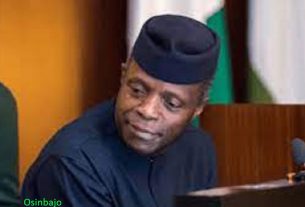By Azuka Onwuka
The recent exit of elder statesmen, Chief Ayo Adebanjo and Chief Edwin Clark, three days apart, was monumental. Despite the longevity both enjoyed, their death were no less sad. Adebanjo died on February 14, 2025, two months to his 97th birthday, having been born on April 10, 1928, while Clark died on February 17, three months to his 98th birthday, having been born on May 25, 1927.
Why is the passing of Clark and Adebanjo significant? It is so because they were titans. They witnessed colonial rule. They participated in the struggle for Nigeria’s independence. They witnessed the First Republic when Nigerians were in charge of the political affairs of the newly independent country. They witnessed the Civil War. They also witnessed all the military regimes and participated in the struggle to get the military out of governance. And since the commencement of the Fourth Republic in 1999, they have been strong advocates for the restructuring of the country, good governance, fairness, justice and equity. Despite their advanced age, they never wavered in speaking out against any act that ran against good governance or justice.
They put their health and safety at risk regularly through their advocacy and trips to different parts of the country to identify with those who face physical or emotional problems. They participated in different conferences that were meant to fashion out a new way for Nigeria. Sadly, most of the noble decisions at those conferences were never implemented.
One wonders how they felt that most of the dreams they had about Nigeria did not materialise in their lifetime. How frustrating it is for someone to live for almost 100 years, dreaming of a better country and working for it, but not realising it all through those ears! For their contemporaries who died in the First Republic—in the 1960s—one could say that Nigeria was just taking off and was learning the ropes. There was still hope that after some faltering steps, Nigeria would mature and start progressing. Even for those who died in the Second Republic—as well as in the 1990s—one could still hope that by the turn of the century, Nigeria would change course and turn into the path of recovery.
But to work all these years, talking, advising, and advocating without seeing positive results must be very discouraging. One can only wonder what was going through their minds in their last days, seeing that Nigeria was not getting better. Sadly, based on the results, one could argue that Nigeria’s golden era was from 1950 to 1966. The silver era took off and ended in 1983.
The exit of Adebanjo and Clark reminds one of the great Nigerian patriots like Chief Gani Fawehinmi, Prof. Chinua Achebe, Mallam Aminu Kano, Chief Anthony Enahoro, Senator Joseph Tarka, Dr Beko Ransome-Kuti, Prof. Dora Akunyili, and many others who fought for a just and progressive Nigeria but never saw anything close to it before they departed. The recurring decimal in Nigeria is that Nigerians are always dissatisfied with their present situation, but years later, they will discover that the past situation is better than the current situation, a testimony that the country is not progressing.
For example, between 60 and 70 years ago, people could win elections in regions outside theirs. People could emerge as vice chancellors of universities in states outside their region or zone. Less than 50 years ago, the Nigerian naira was stronger than the British pound and the American dollar. Nigerians respected graduates of Nigerian universities more than those of Western universities. Those who finished secondary school could conveniently work in different organisations as teachers, journalists, broadcasters, clerks, secretaries, etc. (This still happens in most developed countries today). Until the 1980s, top Nigerian employers went to universities to poach the best-performing final-year students with enticing offers. Some were offered brand-new cars as part of the deal to make them choose such companies above others once they graduated.
Then, it was rare to hear that a graduate could not find a job. One could complain that the salary was not satisfactory but not that there was no job. The reason was that there were hundreds of companies that were engaged in one form of production or the other. In addition to the auto-assembly plants, there were many textile mills in different parts of the country. In the 1980s, Nigeria had over 160 textile mills, creating over 500,000 jobs, and having the record of being the third largest in Africa. There were also paper mills. There were companies manufacturing shoes, roofing sheets, ceramics, plastics, batteries, furniture, iron rods, ceiling boards, sugar, biscuits, drinks (alcoholic and non-alcoholic), books, etc.
The Nigerian-owned airline, Nigerian Airways, was operational and flying to virtually all major cities in the world. There were many national newspapers, including those owned by the Federal Government. Virtually every state had a functional newspaper. Each of the top newspapers was selling several hundred thousand copies every day. There were also news magazines and entertainment magazines published across the country. The hospitals were functional. The teaching hospitals were so good that some leaders from other countries in Africa and Asia, especially, came to Nigeria for treatment.
What it meant was that each of the companies needed human beings to run and be successful. Therefore, graduates of different disciplines had places where their services were needed. Those who stopped their education at the secondary school level also had companies where their services were needed. Even some of those who finished at the primary school level still got employed by some of the companies. Therefore, the employment rate was high, which made the people rich and able to buy brand-new cars and other essential things of life. Those who were running their businesses were also flourishing because there was a high demand for goods and services from local businesses. The only foreign products that thrived were those with no local alternatives.
But all that began to change when the military truncated democracy again in the mid-1980s and devalued the naira, thereby making it more lucrative to import goods than to manufacture them locally. In addition, the psyche of Nigerians was altered: a new narrative, which celebrated people with unknown sources of wealth, emerged. Advance fee fraud and drug trafficking became two major sources of this overnight wealth. Since then, Nigeria has been going down on the key indices of human development, perhaps, except for a few years in the administration of Chief Olusegun Obasanjo when the Nigerian economy was revived and the middle class returned.
The regress Nigeria faced from the mid-1980s speedily changed the country from a wealthy nation to a struggling one whose citizens were desperate to relocate to other countries for better opportunities, security and stability. Even the political and business leaders of Nigeria, who are financially stable and can afford enough security, ensure that they have property abroad where their families regularly stay. They have their holidays and medical treatment abroad. Their children also have their education abroad.
Adebanjo and Clark have played their part in making Nigeria a better country. It is just unfortunate that their efforts did not yield the expected results before their exit. They might have died fulfilled in that they reached the peak of their career and did their best for their country and humanity, but it is obvious that they were not happy that they did not see the Nigeria of their dream. This is the fate that has befallen millions of Nigerians who have died in the last 60 years.
When will Nigerians and their leadership implement the suggestions of restructuring that patriots like Clark and Adebanjo have been making for decades? Is there anybody enjoying this predictable path of regression Nigeria has been on for decades? These are questions begging for answers.
X: @BrandAzuka






